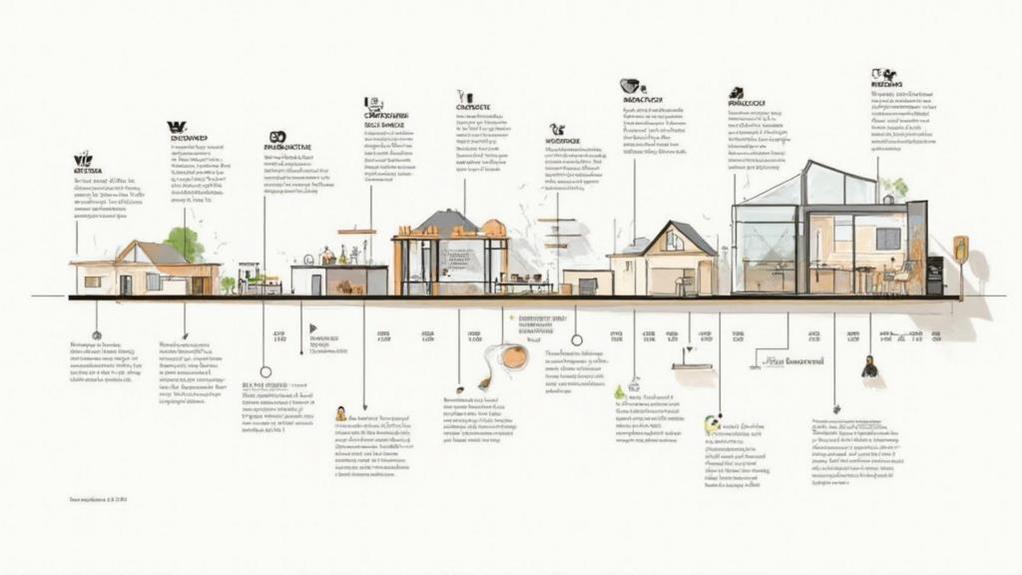When you’re planning a kitchen renovation, understanding the timeline can greatly impact your experience. You’ll start with initial planning and budgeting, which sets the stage for everything that follows. After that, design choices and material selections come into play, leading to demolition and installation. Each phase has its own intricacies and potential delays that can catch you off guard. As you move through each step, you’ll want to know what challenges might arise and how to navigate them effectively, especially as you approach the final inspection and the moment when your new kitchen becomes a reality.
Key insights
- The kitchen renovation timeline varies based on project complexity, typically ranging from a few weeks to several months.
- Initial planning includes setting a budget, which should factor in materials, labor, and a contingency fund of 10-20%.
- Design and material selection can extend the timeline, as approvals and orders may take additional time to finalize.
- Demolition and preparation phases require careful planning, particularly for waste disposal and utility shutdowns, to ensure safety and efficiency.
- Installation involves coordinating deliveries and precise measurements, with a final inspection to ensure everything meets quality standards before completion.
Initial Planning Phase
The initial planning phase is essential for a successful kitchen renovation. You’ll want to begin by establishing your budget considerations.
Determine how much you’re willing to spend and account for all potential expenses, including materials, labor, and unexpected costs. It’s wise to set aside a contingency fund, typically around 10-20% of your total budget, to cover any surprises that may arise during the renovation.
Additionally, seeking guidance from professional kitchen fitters can provide valuable insights into realistic budgeting and cost management.
Next, set realistic timeline expectations. Assess how long you expect the renovation to take, factoring in the complexity of your project and the availability of contractors.
Generally, a kitchen renovation can take anywhere from a few weeks to several months, depending on the scope. You should also consider the time needed for design approvals and material orders, as delays in these areas can extend your timeline.
Design and Material Selection
When commencing the design and material selection phase of your kitchen renovation, you’ll want to contemplate both functionality and aesthetics. This is your opportunity to create a cohesive space that meets your cooking needs while reflecting your personal style.
Start by establishing a color scheme that resonates with you; consider how colors influence mood and lighting in the kitchen. Soft neutrals can create a calm atmosphere, while bold hues can energize the space. Incorporating high-quality materials, such as those offered by Kitchen Fitters Sheffield, can also enhance the durability and aesthetics of your kitchen.
Next, focus on countertop options, as they play an essential role in both design and practicality. Popular choices include granite, quartz, and butcher block. Each material offers unique benefits, from durability to maintenance requirements.
Think about how these surfaces will complement your chosen color scheme and overall design theme.
Don’t forget about cabinetry and flooring, as they should harmonize with your selected colors and countertops. Selecting materials that are both stylish and durable will guarantee your kitchen renovation stands the test of time.
Demolition and Preparation
Before diving into the exciting phase of kitchen renovation, you’ll need to tackle demolition and preparation. This vital step sets the foundation for your new kitchen. Start by removing existing fixtures, cabinetry, and appliances.
If you’re considering professional help, kitchen fitting services are available for diverse designs, guaranteeing a seamless changeover. Make certain you’ve planned your waste disposal ahead of time; renting a dumpster can streamline this process.
Prior to commencement, implement essential safety precautions. Wear protective gear like gloves, goggles, and masks to shield yourself from dust and debris. If you’re dealing with older materials, be aware of potential hazards like lead paint or asbestos, and consider hiring professionals for safe removal.
Next, shut off utilities such as water and electricity to avoid accidents. As you dismantle, take care to document any plumbing or electrical systems you’ll need to reference later.
It’s also wise to have a plan for debris removal; keeping your workspace tidy not only guarantees safety but also helps maintain efficiency.
Once the demolition is complete, thoroughly clean the area, preparing it for the next steps in your kitchen renovation journey. This careful preparation will pave the way for a smooth installation process, making sure your vision comes to life seamlessly.
Installation Process
As you shift from demolition to the installation process, you’ll find that careful planning and organization are key to bringing your kitchen vision to life. This phase involves implementing various installation techniques to guarantee everything fits perfectly and functions well.
First, your contractor will coordinate the arrival of materials, guaranteeing that cabinets, countertops, and appliances are delivered on schedule. Effective contractor coordination is essential as they manage timelines and communicate with different tradespeople involved in the project. You’ll want to be present during the installation to address any questions or concerns that may arise.
Next, the installation typically begins with cabinetry, followed by countertops, backsplashes, and finally, appliances. Each step requires precise measurements and careful handling to avoid damage. When it comes to installation techniques, your contractor may use methods like leveling cabinets, securing them to the wall, and guaranteeing proper spacing for appliances.
Throughout this process, stay engaged and ask questions. This not only helps you stay informed but also guarantees that your expectations align with the work being done.
The installation process is where your kitchen truly begins to take shape, setting the stage for the final touches to come.
Final Inspection and Touch-ups
After the installation is complete, conducting a final inspection and making necessary touch-ups is essential for guaranteeing your kitchen meets the highest standards. This step not only assures quality but also enhances the overall aesthetic of your space.
Begin with a thorough final walkthrough, checking every detail from cabinetry to countertops. Use an inspector checklist to guide you through this process, noting any imperfections or areas needing adjustments.
Pay close attention to paint finishes, hardware alignment, and the functionality of appliances. Inspect for any gaps that need caulking or touch-up paint. If you find discrepancies, don’t hesitate to communicate these to your contractor. They should be prepared to address these concerns promptly.
Additionally, consider the lighting. Confirm all fixtures are working properly and that the illumination is evenly distributed throughout the kitchen.
Once you’ve completed your inspection and touch-ups, take a moment to appreciate your newly renovated kitchen. This final stage not only solidifies the quality of the work done but also sets the stage for many enjoyable moments in your beautifully transformed space.
Frequently Asked Questions
How Can I Budget Effectively for a Kitchen Renovation?
To budget effectively for your kitchen renovation, start with a detailed cost breakdown.
List materials, labor, and any additional expenses like permits.
Don’t forget to account for unexpected costs; it’s wise to add a buffer.
Explore renovation financing options, like personal loans or home equity lines of credit, to help manage cash flow.
What Permits Do I Need for My Kitchen Renovation?
Before starting your kitchen renovation, you’ll need to check local regulations to determine what permits are required.
Typically, you’ll need permits for structural changes, electrical work, or plumbing modifications.
Research specific requirements based on your kitchen designs and renovation materials.
It’s wise to consult with a contractor or local building department to guarantee compliance, as failing to obtain necessary permits can lead to fines or project delays.
How Do I Choose the Right Contractor for My Project?
Choosing the right contractor for your project involves evaluating contractor qualifications and guaranteeing strong project communication.
Start by checking their licensing, insurance, and references. Interview multiple candidates to assess their experience and approach to your specific needs.
Discuss your expectations clearly to gauge their responsiveness and ability to communicate effectively throughout the renovation. A contractor who listens and provides consistent updates will help guarantee a smoother, more successful project.
Can I Live in My Home During the Renovation?
Yes, you can live in your home during the renovation, but it depends on the extent of the work.
If you’re creating a temporary kitchen, you’ll need to set up a space for cooking and dining.
Keep in mind home safety; make certain the workspace is secure, especially if kids or pets are around.
Communicate with your contractor about any concerns, and they’ll help you navigate the process while minimizing disruptions to your daily life.
What Should I Do if Unexpected Issues Arise During Construction?
If unexpected issues arise during construction, address them promptly.
First, assess the situation and gather all relevant information.
Then, communicate effectively with your contractor; clear communication strategies can help resolve problems quickly.
Discuss potential unexpected delays and their impacts on your timeline.
Stay flexible and open to solutions, as this can lead to better outcomes.
Keeping a positive attitude will also help maintain a good working relationship throughout the renovation process.
Summary
Understanding the kitchen renovation timeline helps you navigate the process with confidence. By planning thoroughly, selecting the right materials, and coordinating with your contractors, you can secure a smoother experience. Each phase, from demolition to installation, plays an essential role in achieving your dream kitchen. Don’t forget to schedule that final inspection and touch-ups to assure everything meets your expectations. With careful management, you’ll soon enjoy a beautifully renovated kitchen tailored to your needs.














